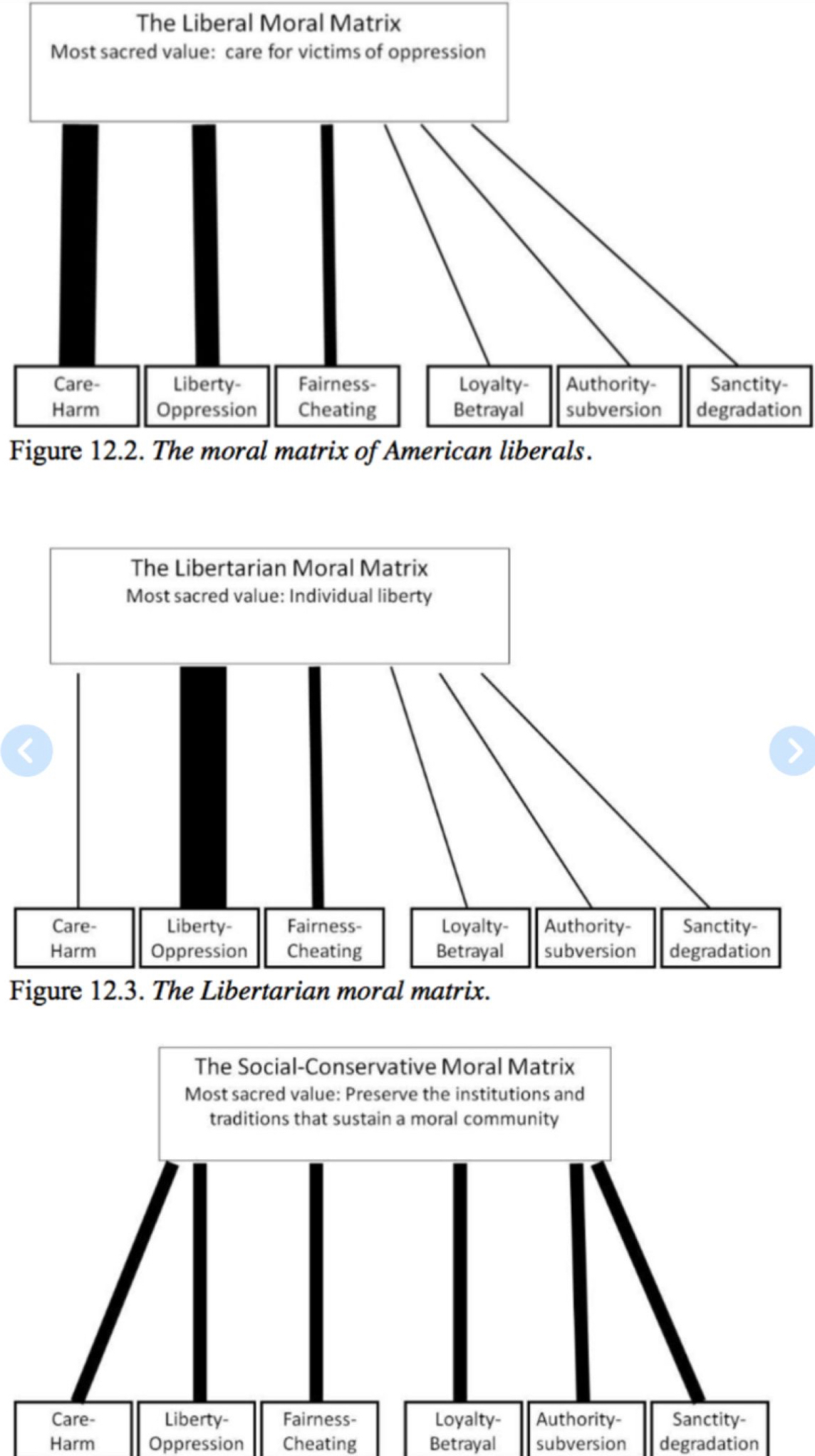
Lehet elgondolkozni… politikai filozófia… ilyen is van…:-))) nem is érdektelen, hogy kinek-kinek mi a preferenciája (én még feldolgozás közben vagyok…:-)))
The Guardian vonatkozó cikke erről:
“How do we know the difference between right and wrong? Are we born with an innate sense of morality or do we learn it from those around us? Which moral issues do we believe should be legislated and which left down to individuals to decide?
Jonathan Haidt and colleagues have reviewed literature from a diverse range of disciplines and cultures and done a great deal of field-work to try and answer these questions. Their conclusion is that the content of moral thinking is probably learned but that we are born already primed to think about morality along five channels (taken from http://moralfoundations.org):
1) Care/harm: This foundation is related to our long evolution as mammals with attachment systems and an ability to feel (and dislike) the pain of others. It underlies virtues of kindness, gentleness, and nurturance.
2) Fairness/cheating: This foundation is related to the evolutionary process of reciprocal altruism. It generates ideas of justice, rights, and autonomy.
3) Loyalty/betrayal: This foundation is related to our long history as tribal creatures able to form shifting coalitions. It underlies virtues of patriotism and self-sacrifice for the group. It is active anytime people feel that it’s “one for all, and all for one.”
4) Authority/subversion: This foundation was shaped by our long primate history of hierarchical social interactions. It underlies virtues of leadership and followership, including deference to legitimate authority and respect for traditions.
5) Sanctity/degradation: This foundation was shaped by the psychology of disgust and contamination. It underlies religious notions of striving to live in an elevated, less carnal, more noble way. It underlies the widespread idea that the body is a temple which can be desecrated by immoral activities and contaminants (an idea not unique to religious traditions).
They argue that humans are naturally sensitive to this range of (sometimes competing) moral issues as a result of biological and cultural evolution. Further, they make the bold claim that they can predict how an individual will vote based on how they prioritise these five issues.
Try it at home
You can see how your own moral priorities compare to those of the average Liberal or Conservative voter by registering and completing the ‘Moral Foundations Questionnaire’ here: www.YourMorals.org. This was created by Jesse Graham and Jonathan Haidt and has been completed by over 30,000 people across a range of countries and political contexts. You also have the option of creating your own groups to see how your responses compare to those of your friends and colleagues.
How it works
Haidt and colleagues argue that humans are born primed to care about these five channels of moral thinking but diverge in the way that they rank them. The questionnaire includes three questions for each of the five moral channels and responses are averaged to produce a score of how important you rate that particular issue.
They examined responses from not just the US but also Canada, the UK, Western Europe, Eastern Europe, Australia, Latin America, East Asia and South Asia. Across all these countries they find the same general pattern.
Liberals and Conservatives both care about harm and fairness – issues that focus on treating other individuals well. Liberals rate these issues slightly higher than Conservatives but, on the whole, everybody cares about problems such as inequality and exploitation and believe they should be legislated against.
The great divergence occurs on the other three channels – in-group loyalty, authority and sanctity. These revolve around ideas of being a good social member of a group or supporter of social order and tradition. Conservatives score higher than Liberals on all three of these issues.
From a cultural evolution perspective, these issues are vitally important to maintaining coherence and order among groups of people. They drive individuals to rise above their carnal desires as individuals and strive together towards higher, nobler ends.
However, these traditional moral values have historically been very repressive to less powerful groups within societies: to women, the poor, immigrants and those who are perceived to not fit in. As Haidt puts it, Liberal voters say “… no, let’s celebrate diversity, not common group membership. They say let’s question authority and they say keep your laws off my body.”
Importantly, these moral biases are often unconscious so are difficult to acknowledge in the light of contradictory evidence or opinion. Haidt refers to voters as being caught in a particular moral matrix that drives where their priorities lie and what information they attend to.
There are many factors contributing to polarisation of voters in America, the UK and other countries. The Moral Foundations theory is relatively new and open to adaptation and challenges. But it seems to provide a useful and predictive framework that could be better used to understand these differences and address them.
The Guardian: https://lnkd.in/ewA52HJm
